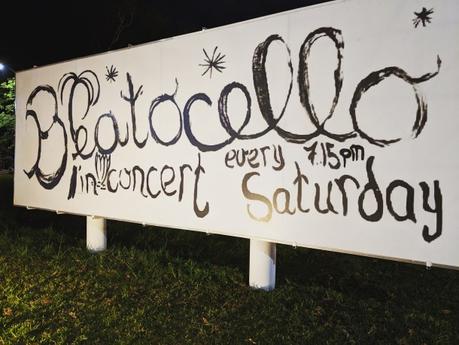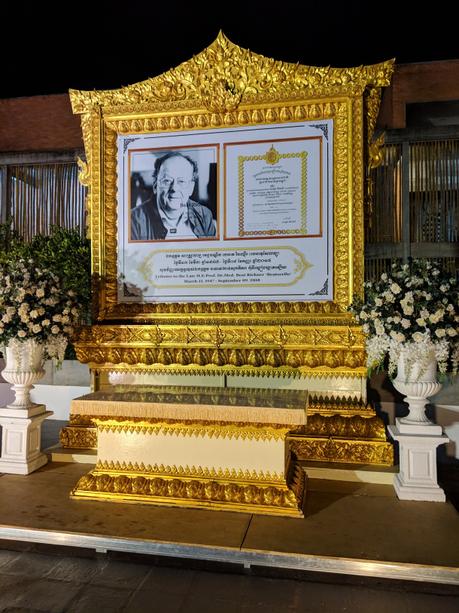My significant other and I spent a fair amount of time last month backpacking my way across Cambodia. Whilst we were doing the usual rounds, looking at temples, and doing the usual touristy things, we came across a huge hospital, with the sign below:

Only while working out the details of the Beatocello concert, which we had never even heard of before landing up in Siem Reap, did we learn about the amazing life of Dr. Beat “Beatocello” Richner. As we read more about this incredible physician and his life’s work, with much regret, we learnt of his demise, which had happened only a couple of months earlier.
Dr. Richner received his specialization in Pediatrics, from the Zurich Children’s Hospital, in 1973. In 1974, the Swiss Red Cross despatched him to Cambodia, which was mired in a civil war, a struggle for power between the rebel forces of the Khmer Rouge and the government of Lon Nol. Dr. Richner’s mission came to an abrupt halt when he was sent back home by the Khmer Rouge once they had ousted the sitting government and grabbed power. Dr. Richner returned to Zurich and started working at the Children’s Hospital. In 1980, he opened his own private practice, and kept pursuing the beaten track of a clinical career in the developed world.
However, it seemed that his heart was still in Cambodia… in 1991, once the unrest had settled, and the UNTAC (United Nations Transition Authority for Cambodia) restored a semblance of peace and governance, the Cambodian Government called on him to rebuild and manage the Kantha Bopha Children’s Hospital, which the Khmer Rouge had destroyed as it did not fit into their Utopian schemes of a classless communist society. Dr. Richner was back in Cambodia, but with a long-term goal in his mind. In March 1992, he created a foundation in Zurich, and relocated to Phnom Penh with the express desire of rebuilding the nation’s healthcare services, and not just ONE hospital. Within a few months, he managed to get the Kantha Bopha Children’s Hospital up and about, with patients streaming in from 2nd November onwards. Over time, he ended up founding four more such hospitals, which, in 2017, were estimated to have delivered almost 80% of the tertiary healthcare needs of the country. Dr. Richner’s foundation website claims:
Over the last 23 years the Kantha Bopha hospitals have treated 13 Million outpatients & 1.56 Million seriously ill children requiring hospitalisation.
In addition to this remarkable feat of institution building, nay, nation building, Dr. Richner found an innovative way of connecting the vast swirling crowds of tourists that thronged Cambodia every year. During his medical training, in the 1970s, he developed the character that he dubbed Beatocello – an artistic alter ego, a musical comedian – where the cello, his instrument of choice, and his banter, were the principal draws. Over the years, he gave numerous performances across Europe, but when he landed in Cambodia, he hit on this marvelous plan, of holding a weekly, free concert, where he would be the main draw.
At these shows, in addition to his music and stories, he would often address a packed house of tourists, asking the younger ones to donate blood, the older ones to donate money, and the ones in between, to donate both. He was a polyglot, and conversed with the crowd in English, German or French, and often pulled out people from the crowd for gentle ribbing. He would intersperse his music, recounting the horrors that the Cambodian people had lived through, and how he, and his series of Kantha Bopha hospitals, were trying to apply a balm on those still raw wounds.
Another travel blogger, who had the good fortune of actually being at one of the Beatocello shows, writes about it:
You learn about Cambodia’s past and present
Having lived in Cambodia for the past 23 years, Dr. Richner has quite the knowledge about Cambodia’s past and present. You won’t just get Cello show but also a knowledgeable insight into Cambodia’s current political and social complexities, especially in the health division. Although remaining ‘politically correct’, Dr. Richner touches on some important aspects of Cambodia’s (and the world’s) health policies that leave us very much apprehensive and perplexed.
You get a humorous performance
Having been quite the musical comedian in his time, Dr. Richner will be sure to put on a show full of witty remarks and comedic behavior. Speaking a variety of languages including Swiss, German, French and English, and with considerable knowledge of world politics, be prepared to get picked out of the crowd for some innocuous humor.
You hear the sweet sounds of the Cello
Dr. Richner goes by the stage name of Beatocello, which comes from the combination of his first name and his favorite instrument, the Italian Cello. Having played the Cello for most of his adult life he is quite the performer and will put on a beautiful show of bittersweet, soulful music to your ears and to your heart, telling the story of the people of Cambodia through each of his performances.
We were quite humbled by these bits of information, and we regretted it slightly that Dr. Beat had passed away merely weeks earlier; we were passing through Siem Reap in the last week of 2018, and he had died on 9 September.

The New York Times published a touching obituary about Dr. Richner’s death. It paints a quaint picture of the good doctor:
“His life was very limited and connected to only two things,” said Dr. Ky Santy, who became the director of Kantha Bopha after Dr. Richner stepped down for health reasons last year. “First, to the daily life of the hospital; and second, to the cello.”
Living austerely, Dr. Richner worked 12 hours a day, took no vacations and drove a 22-year-old car. He used a corner table at the hospital canteen as his office, meeting with staff there as he ate his customary breakfast of two hard-boiled eggs and a cup of coffee. For lunch, he would eat the same fare in the same spot before embarking on his hospital rounds. At 3:30 p.m. he would practice music.
Another blogger, who seemed to have attended his Beatocello sessions, and seems to be located in Cambodia, writes about the fire of Dr. Richner:
He doesn’t pull any punches: the international community, through the World Health Organisation, is accused of accepting and even promoting a situation where countries have to match the quality of their healthcare to their wider economic situation.
But that seems fair enough doesn’t it? As I heard him speak, I couldn’t help thinking that it’s only reasonable that we live within our means – if you’re a poor country you can only afford to provide a certain level of care. It’s not nice, but it’s the way things work – isn’t it?
No, absolutely not said Dr Richner, anticipating the objection and swiping his cello bow dismissively. This may be how things are, but it is not how they have to be. In fact, accepting this situation, in his view, amounts to a policy of “poor medicine for poor people in poor countries”. If we tolerate this, we are complicit in nothing short of a “passive genocide of children”. Strong words.
The endeavor of one man, and his cello, to provide quality healthcare in a country ravaged by war, destruction, death, disease and corruption, is a beacon of hope and inspiration. The fact that he not only provided medical care, but also stepped in to challenge the status quo, often taking his fight to the WHO or the Cambodian Government, is admirable.
The Kantha Bopha Hospitals have treated millions of Cambodian children, and provided them with quality healthcare which would be virtually impossible to provide using the existing infrastructure. Stepping in, he created this unique healthcare ecosystem, without overriding it with expats, and working alongside the Ministries, to ensure that the hospitals lived on beyond him.
